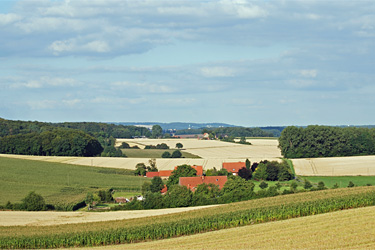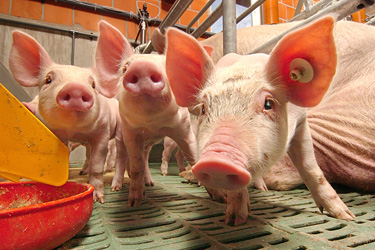E4 - Pig fattening in Münsterland and processing of harvested products




Description of the region
Münsterland is a region in the northwestern part of Westphalia in the federal state of North Rhine-Westphalia. The capital of the Münsterland is the eponymous Westphalian city of Münster. The predominantly rural structure is shaped by parklands and intensive agriculture. Fields, meadows, pastures, small forests and hedge banks dominate the scenery.
Economy
Münsterland is a predominantly rural area. Agriculture is focused on steer and pig fattening, as well as the keeping of milk cows and the breeding of piglets. Due to structural changes in the primary sector, only 1.5 % of the entire labour force is employed by an agricultural business. The region’s economic output is mainly generated by businesses of the secondary and tertiary sector. Mechanical engineering, construction, food production, health and social services are among the most significant industries.
Slaughtering and processing
Two slaughterhouses that belong to the top companies in Europe are based in Münsterland. Westfalenland Fleischwaren GmbH is a subsidiary of Westfleisch eG which is one of the major German producers of fresh self-service meat and fresh meat convenience products.
Pig fattening
Elmar Schulze Heil in Münster-Amelsbüren subsists on cultivation and pig fattening. In 2013, he invested into a “Pig-Port“ for fattened pigs. The outdoor climate barn guarantees a sufficient air supply for both human beings and animals. Systems for liquid manure, shedding and feeding fulfil the standards of the conventional pig fattening facility which is also located on the farmyard.
Organic pork and cooperation
Angenendt-Strnad GbR in Drensteinfurt, Warendorf district, is focused on organic farming and pig fattening. The regional commercialisation of pork is performed by Biofleisch NRW. Further business units besides animal husbandry are seed multiplication and the cultivation of vegetables in the open field.
Culture and history
“Haus Rüschhaus“ is located in the suburbs of Münster and was built by the famous baroque architect Johann Conrad Schlaun. Its serves both as farm and as mansion. After her father had deceased, the Westphalian poet Annette von Droste Hülshoff used to live in “Haus Rüschhaus“ from 1826 to 1846. This is where she wrote her novella “The Jew’s Beech“ – one of her most famous masterpieces.
Guide: Ulrich Koscielny, Agricultural Chamber of North Rhine-Westphalia


 De
De